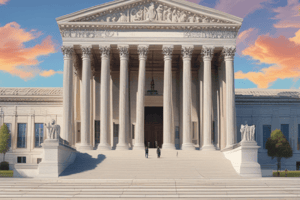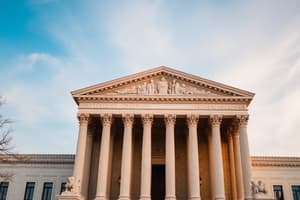Podcast
Questions and Answers
Which Constitutional Amendment affirmed that national law is supreme over conflicting state law?
Which Constitutional Amendment affirmed that national law is supreme over conflicting state law?
- Amendment 14 (correct)
- Amendment 10
- Amendment 9
- Amendment 13
What concept in the constitution refers to the sharing of power between the national government and state governments?
What concept in the constitution refers to the sharing of power between the national government and state governments?
- Dual Sovereignty (correct)
- Reserve Powers Clause
- Concurrent Powers
- Fiscal Federalism
Which Supreme Court Case affirmed that false written statements harming a person's reputation constitute libel?
Which Supreme Court Case affirmed that false written statements harming a person's reputation constitute libel?
- McCulloch v. Maryland
- Brown v. Board of Education of Topeka (correct)
- Habeas Corpus
- Slander v. Libel
What did Amendment 19, ratified in 1920, grant to women?
What did Amendment 19, ratified in 1920, grant to women?
What are the powers accorded to the states in Amendment 10 known as?
What are the powers accorded to the states in Amendment 10 known as?
What is the concept referred to as 'the provision of categorical and block grants by the federal government to state and local governments'?
What is the concept referred to as 'the provision of categorical and block grants by the federal government to state and local governments'?
Which landmark Supreme Court decision set the precedent for judicial review?
Which landmark Supreme Court decision set the precedent for judicial review?
When was the Bill of Rights passed?
When was the Bill of Rights passed?
Which level of government did the framers seek to restrict with the Bill of Rights?
Which level of government did the framers seek to restrict with the Bill of Rights?
What is the main focus of the First Amendment?
What is the main focus of the First Amendment?
Which political expression is guaranteed under the First Amendment?
Which political expression is guaranteed under the First Amendment?
What is the difference between libel and slander as protected by the First Amendment?
What is the difference between libel and slander as protected by the First Amendment?
Flashcards are hidden until you start studying
Study Notes
Marbury v. Madison
- Set the precedent for judicial review
- Established the Supreme Court's power to declare laws unconstitutional
The Bill of Rights
- Added to the Constitution in 1791
- Protects individual freedoms and limits government power
- Consists of the first 10 amendments to the Constitution
Key Amendments
First Amendment
- Places limits on Congress
- Prohibits the establishment of a national religion
- Guarantees freedom of speech, assembly, petition, and the press
- Distinguishes between libel (false written statements) and slander (false spoken words)
Other Amendments
- 4th, 5th, 6th, and 8th Amendments: criminal due process rights
- 9th Amendment: indicates that the listed civil liberties are not exhaustive
- 10th Amendment: Reserved Powers Clause, acknowledging state authority over domestic matters
- 13th Amendment: outlawed slavery (1865)
- 14th Amendment: citizenship rights, equal protection under the law, and due process (1868)
- 19th Amendment: women's right to vote (1920)
- 26th Amendment: lowered the voting age to 18 (1971)
Key Concepts
Federalism
- McCulloch v. Maryland: affirmed national law's supremacy over conflicting state law
- Horizontal federalism: state-to-state obligations and relationships
- Concurrent powers: shared authorities between national and state governments (policy-making, revenue generation, court establishment, and policy implementation)
Intergovernmental Relations
- Fiscal federalism: federal government's provision of categorical and block grants to state and local governments
- Dual sovereignty: federal system, sharing power between national and state governments
Landmark Supreme Court Cases
- Brown v. Board of Education of Topeka (1954): ended "equal but separate" practices in the Southern states
- Civil Rights Act of 1964: prohibits discrimination based on race, color, religion, sex, or national origin
Studying That Suits You
Use AI to generate personalized quizzes and flashcards to suit your learning preferences.




